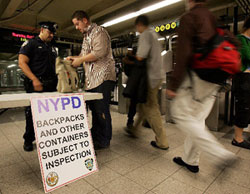Federal Anti-Terrorism Is To Push More Paper?
After the launch of a large-scale security lockdown in the New York subway last week, U.S. intelligence and counterterrorism officials now claim the terrorist threat may have been a hoax. A voluntary source in Baghdad described a terrorist conspiracy where 20 bombers would set off 19 bombs during last weekend in the New York subway system using bomb-laden suitcases, baby strollers and other items to escape detection. New York Mayor Michael R. Bloomberg described this information as the "most specific threat" ever received against the city's transit system. But this never came to pass. Despite the heightened security on the subway with special police units and National Guard, nothing was found, and in Baghdad, US authorities had "lost" the original informant.
In common government fashion since Katrina, the federal authorities blame the local authorities for the situation. Department of Homeland Security spokesman Russ Knocke, who called the threat "noncredible" last week, had this cryptic message:
The intelligence community has not found any evidence to substantiate the threat information.The president Bush's response was equally avoiding:
Our job is to gather intelligence and pass it on to local authorities. And they make the judgments necessary to respond. . .The American people have got to know that, one, we're collecting information and sharing it with local authorities on a timely basis. And that's important.Needless to say, this prompted some well-found frustration from Micheal Goodwin, who had this to write:
There you have it - the gazillions we spend on security only pay for bureaucrats to push paper. Whatever happens after that, it's not their problem.I have explored this issue many times, believing that the whole "national security" ploy is really just a political platform to run on and beat your opponents with it.
This is nuts. And it adds to cynicism about efforts to fight the real problem of terrorism.
Bloomberg and top cop Ray Kelly did right in taking the threat seriously, but their performance had holes, too. They provided few details at their Thursday announcement, yet within minutes, press reports quoting anonymous sources cited potential bombs in baby carriages and the number of alleged plotters. If Bloomberg and Kelly wanted such details out, they should have announced them so all New Yorkers could be informed. As it was, the inconsistent articles and broadcasts added to the confusion and fear.
I do not have a lot of answers, but creating more government bureaucracy shouldn't even be on the table. If anything, the government needs to break down the walls between the federal and local authorities and streamline communications by reducing red-tape. The first step is installing standardization and interoperability requirements, agreeing on shared information policies and allowing the agencies themselves work out the details. No government bureaucrat is going tell the FBI, CIA or other intelligence agency how to run. They must undertake this task by themselves. There must be a sound third-party that does verify the changes are occurring, of course. But no Intelligence Czar is going to accomplish all of this.
Beyond that, I am not sure what would be next. But if we should be so lucky to get beyond that simple sticking point: reliable and interoperable communication.


0 Comments:
Post a Comment
<< Home